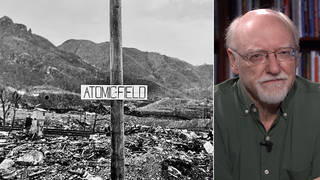
Guests
- Steven Leeperchairperson of the Peace Culture Foundation, which manages the Hiroshima Peace Memorial Museum in Hiroshima.
For more on the emergency response effort, we speak with Steven Leeper of the Peace Culture Foundation, which manages the Hiroshima Peace Memorial Museum in Hiroshima. “In Hiroshima, we are pretty sensitive to radiation issues, and we’re very sensitive to disaster issues,” Leeper says. “We are known as a place that knows about radiation. We have a team of doctors. They left yesterday to go up into that area with their equipment to try to figure out what kind of radiation is up there. We’ve also prepared a lot of apartments, and the hospitals are making preparations to receive radiation victims, people who are suffering from radiation poisoning.” [includes rush transcript]
Transcript
JUAN GONZALEZ: We’re also joined by Steven Leeper. He’s the chairperson of the Peace Culture Foundation, which manages the Hiroshima Peace Memorial Museum in Hiroshima.
Welcome to Democracy Now!, Peter — Steven.
STEVEN LEEPER: Thank you.
JUAN GONZALEZ: Could you tell us, from your perspective in Hiroshima, how the population there is dealing with or trying to assist their fellow countrymen in other parts of the nation who have been affected by the tsunami, as well as by the catastrophe at the nuclear power plant?
STEVEN LEEPER: Yeah, I think Hiroshima — in Hiroshima, we are pretty sensitive to radiation issues, and we’re very sensitive to disaster issues. And, you know, this thing happened on a Friday. By Saturday, we had already sent up a helicopter and a bunch of trucks and all of the blankets in our emergency location. And several trucks of water, we also sent. We actually, at the museum, we have a process that we’re supposed to go through in order to be able to put out donation boxes for something, but we were practically forced by the people to forget that process and just put the boxes out. So we put the boxes out — you know, they were out by Saturday, and people have been donating thousands of dollars trying to do whatever they can to help.
I think — oh, one other thing is that we are known as a place that knows about radiation. We have a team of doctors. I think they left yesterday to go up into that area with their equipment to try and figure out exactly what kind of radiation is up there. This is the big complaint that we have. You know, our doctors — one of our lead doctors, Dr. Hoshi, was on television the other day, and he was complaining that the government doesn’t explain what is in the air right now. And they’re talking about millisieverts, this and that, but it’s meaningless unless you know exactly what the isotopes are that are getting out. So, they’re going up to find out what that is.
We’ve also prepared a lot of apartments and a lot of — well, the hospitals are making preparations to receive radiation victims, you know, people who are suffering from radiation poisoning or need treatment in some way. And so far, as far as I know, we haven’t had any.
JUAN GONZALEZ: And Steve —
STEVEN LEEPER: We have had some refugees from up there coming down here to get away from that area, come to stay with friends and relatives in Hiroshima. But as far as I know, we haven’t had anybody suffering from radiation poisoning here.
JUAN GONZALEZ: Well, Steve Leeper, I’d also like to ask you — the Japanese public has been very supportive in the past of nuclear — peaceful nuclear energy uses, despite the enormous history of the use of atomic weapons in Japan. What do you think is going to be the result of this catastrophe now in terms of public opinion in Japan about nuclear energy?
STEVEN LEEPER: I have the feeling that we are witnessing the end of the nuclear renaissance. There were the — I can’t remember if it was the governor of Fukushima or a mayor of one of the local towns, but some official got on, and he was very angry. He said, you know, “They’ve been telling us all these years that this is impossible, but it’s now happening.” There is general anger.
I know, here in Hiroshima, the anti-nuclear people went down to the local power company, which is trying to build a nuclear power plant in Kaminoseki, which is about 60 kilometers south of here, and they delivered a statement demanding that all work stop immediately on Kaminoseki. And the word I’ve gotten is that the power company is not going to have the money to build that. They’re going to be putting their money into trying to recover from what happened up north. So, the feeling around here that I get from — even from people who are, you know, not your average anti-nuclear power person —- just the average person is saying, “No, this is the end of nuclear power.” Although, you know, we are very committed to it. The nuclear industry in Japan is one of the most powerful nuclear industries in the world. And they won’t lie down without a fight, I don’t think. And we are dependent here -—
JUAN GONZALEZ: OK, well, Steve, we’re going to have to — we’re going to have to leave it there.
STEVEN LEEPER: OK.
JUAN GONZALEZ: I want to thank you, Steven Leeper, the chairperson of the Peace Culture Foundation, which manages the Hiroshima Peace Memorial Museum in Hiroshima, and also to Tetsuo Jimbo, video journalist working in the Miyagi Prefecture, one of the areas hardest hit.












Media Options